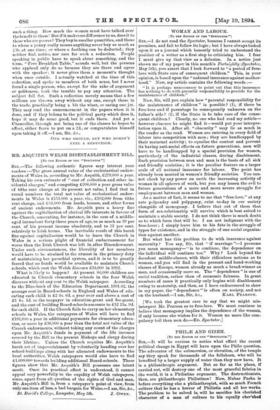MR. ASQUITH'S WELSH DISESTABLISHMENT BILL.
[To THE EDITOR OF THE "SPECTATOR."] Sin,—The following authentic figures may interest your readers :—The gross annual value of the ecclesiastical endow- ments of Wales is, according to Mr. Asquith, £279,000 a year. Taking his own estimate of "cost of collection and other in- cidental charges," and computing £208,000 a year gross value of tithe rent charge at its present net value, I find that in round numbers the total net value of ecclesiastical endow- ments in Wales is £155,000 a year, viz., £102,000 from tithe rent charge, and £53,000 from lands, houses, and other forms of ancient endowments. Mr. Asquith puts a heavy fine against the capitalisation of clerical life interests in favour of the Church, amounting, for instance, in the case of a middle- aged incumbent forty-three years of age, to as much as 39 per cent, of his present income absolutely, and to 51 per cent. relatively to Irish terms. The inevitable result of this harsh fine against capitalisation would be to leave the Church in Wales in a serious plight of financial embarrassment far worse than the Irish Church was left in after Disendowment. Under such circumstances, the liberality of her members would have to be strained to the utmost in the primary duty of maintaining her -parochial system, and it is to be greatly feared that no funds would be available to maintain Church schools, which cost the Welsh dioceses £31,000 in 1892.
What is likely to happen ? At present 86,000 children are educated in Church elementary schools in the four Welsh dioceses without any cost to the Welsh ratepayer. According to the Blue-book of the Education Department, 1891-92, the average cost in Board-schools in England and Wales of edu- cating each child is £2 4s. 6d. a year over and above a cost of 21 8s. id. to the taxpayer in education-grant and fee-grant, and the cost of building Board-schools amounts to £12 15s. 9d. for each child. If the Church fails to carry on her elementary schools in Wales, the ratepayers of Wales will have to find £191,000 a year in additional payments for elementary educa- tion, or more by 236,000 a year than the total net value of the Church endowments, without taking any count of the charges upon Mr. Asquith's funds in payment of the life incomes secured by the Bill to the present Bishops and clergy daring their lifetime. Unless the Church requites Mr. Asquith's harsh act of impoverishment by voluntarily handing over her school-buildings along with her alienated endowments to the local authorities, Welsh ratepayers would also have to find £1,099,000 towards building additional Board-schools. These figures show that Mr. Asquith's Bill possesses one latent merit. Once its practical effect is understood, it cannot appeal very powerfully to the cupidity of Welsh ratepayers, since, apart from all question of the rights of God and man, Mr. Asquith's Bill is, from a ratepayer's point of view, from only one item of loss, a bad bargain for Wales.—I am, Sir, &c., St. David's College, Lampeter, May 5th. J. OWEN.






































 Previous page
Previous page